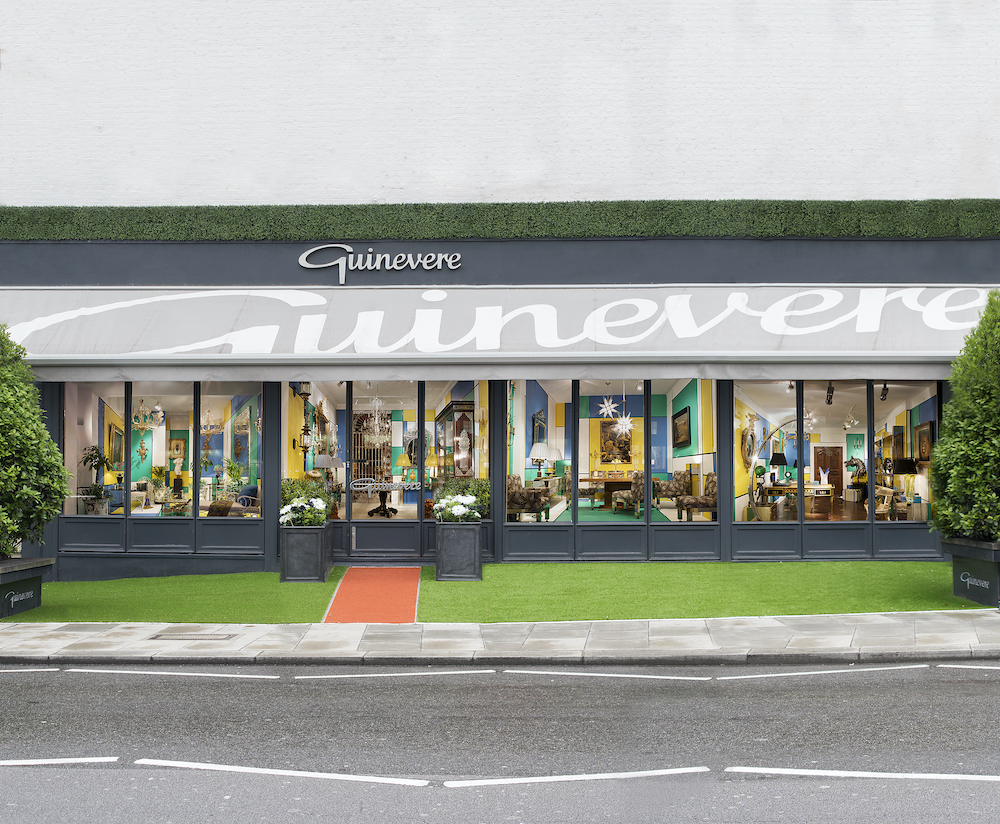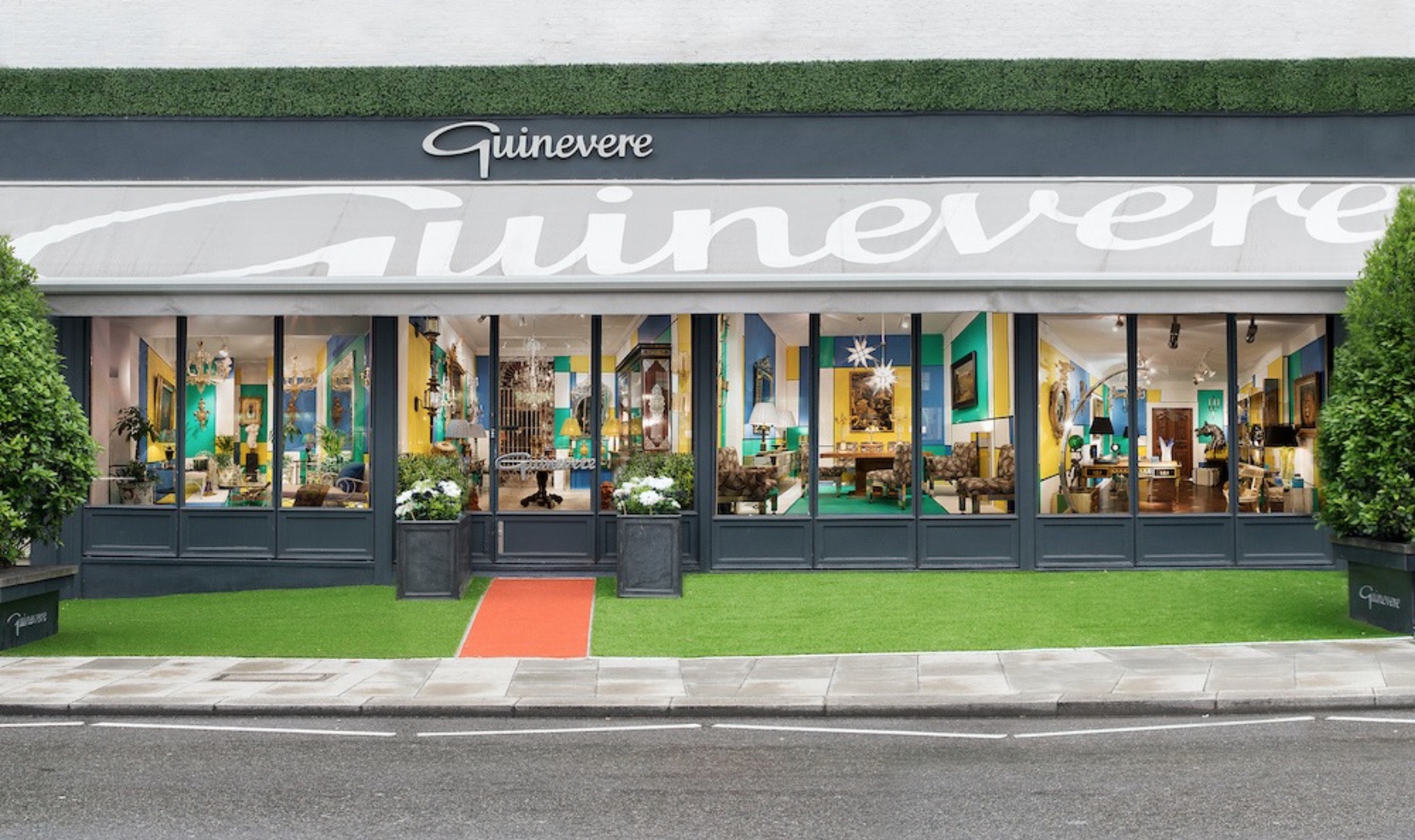#Guinevere #Antiques #shop #sale #Sworders #Antique #Collecting
Following 61 years on the King’s Road in London, Guinevere Antiques finally shut its doors for the last time this Christmas, with the shop’s stock heading to auction in Essex this February.
Sworders in Stansted Mountfitchet will hold the 500-lot sale Guinevere – The Last Hurrah on February 18.
Guinevere Antiques had been a fixture on the Fulham-Chelsea border since 1963. Founder Genevieve Weaver had arrived in post-war London from Normandy in the 1950s, to pursue a career as a hat designer. Instead, after marrying the son of her English teacher, she settled down to raise a family on Portobello Road where she became intrigued by the lively antiques trade operating on her doorstep.

After finding suitable premises at the ‘unfashionable’ Fulham-end of the King’s Road she opened her own antique emporium. The rent was £4 a week. Among her first purchases was the entire contents of a Victorian workhouse packed with old pine furniture.
As the Sixties began to ‘swing’, and antiques and interior design enjoyed a resurgence with the Chelsea set, Genevieve found her niche. Part of that pioneering group of dealers who bought with their eye rather than a reference book, she purchased only things she liked herself, objects that could be enjoyed and lived with. She famously observed “if something was ugly in the 19th century, it’ll still be ugly now”.
Her international blend and the mixing and matching objects from different periods and cultures was ground-breaking. First driving a van across the Channel to France, she brought French provincial furniture, lighting and glass back to the King’s Road where it became a favourite with American decorators. Later, as the clientele widened and the shop grew to occupy four interconnected units across over 7,000 square feet, Genevieve broadened her horizons and began to shop for stock in India, Singapore and Hong Kong.
From Chinese furniture to Anglo-Indian works of art, the store became a go-to destination for decorative antiques and one-off works from around the globe. Tinged with this Eastern exoticism, the Guinevere hallmark became the juxtaposition: the ancient and the modern, the theatrical and the retrained, the classic and the provocative. The flamboyant window displays were legendary.
“The name Guinevere became synonymous, not so much with antiques as with antiques with attitude,” recalled Genevieve shortly before she passed away in 2000.
Her sons, Marc and Kevin, had joined the business in the early 1980s when the shop had become the regular haunt for decorators, collectors and celebrities alike. Fashion designer Valentino once said: “I own so many items from Guinevere, I can now open my own shop.”
However, Marc Weaver recalls his introduction to the company at the age of 20 was anything but glamorous: “I was not doing anything except having a good time, and my mother suggested, rather uncompromisingly, that I could either work or get out. She did, however, offer me work scrubbing pine furniture outside. Eventually I was allowed to help in the shop and, well, the rest is history.”
His wife Heather joined the Guinevere team in the late 1980s. She was the driving force behind Guinevere’s textile department, bringing to the stock its exceptional array of throws and rugs and the bespoke range of lampshades made from vintage fabrics, which became a best seller. In-house stylist Dean Robinson, who joined 20 years ago, continued the tradition of those exuberant King’s Road window displays – the 21st-century antiques – that literally and figuratively stopped traffic on the street.
“Marc and I have run and developed Guinevere Antiques in the past two decades, staying true to the ideals established by Genevieve” said Kevin Weaver. “What made us stand out were two attributes: the melange of what we were buying and our unique presentation. These principles remain with us today. Everything needed to have visual appeal, originality of design and quality of manufacture.”
The proof of this formula has been in its longevity. The shop continued to thrive long after others that were made in its mould had closed, moved on or moved online. The firm passed its 50th anniversary in 2013 and marked its 60th anniversary with a sale held in 2023.
However, following the recent sale of the Guinevere building to a property developer, the time has come for the Weavers to plan a new future. “It’s been an absolute blast, and we have met so many wonderful clients who have become friends over the years” said Marc. “There are probably items from Guinevere in every corner of the globe and we are honoured to have been part of so many of your decorating journeys.”
Sworders’ sale will once more bring some of the alchemy of a beloved antiques emporium to market. This cross-section of the Guinevere ‘look’ will run the gamut from period lighting, furniture, textiles, decorative arts to contemporary works. Flemish tapestry fragments will rub shoulders with Anglo-Indian boxes from Vizagapatam and a series of carved wood roof ornaments from a Thai palace.
Italian works of art will include a pair of baroque silver gilt console tables c.1700, estimated at £1,500-2,000 and a pair of Florentine red and grey marble sculptures of recumbent lions made c.1820 in the Renaissance style, estimated at £1,500-2,500. From France are a Baccarat-style cut glass and bronze 12-light chandelier c.1900, with an estimate of £1,000-1,500 and a pair of Louis XVI ormolu table candelabra ‘a la Grec’ c.1770 estimated at £500-700.
Something more contemporary is a coffee table fashioned with a fossilized ammonite marble top and a gilt bronze base with swept legs carrying an estimate of £700-1,000.
The one unifying element of all these lots is a great sense of chic and sophistication. “My mother was our mentor and teacher in this business” said Marc. “She showed me that good taste can be learned, but style is something you are born with.”
To whet the appetite, highlights will be on view at Sworders’ London gallery in Cecil Court in the run-up to the sale before all lots will be displayed together at Stansted Mountfitchet.





